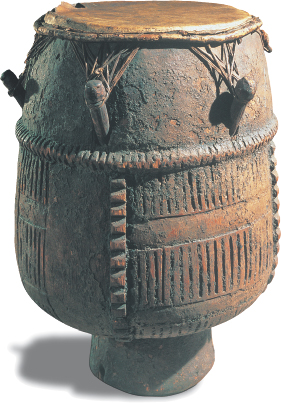5.6.3 Slave Labor and African American Culture.
Printed Page 116 Chapter Chronology
Slave Labor and African American Culture. Southern planters expected slaves to work from sunup to sundown and beyond. George Washington wrote that his slaves should "be at their work as soon as it is light, work til it is dark, and be diligent while they are at it." The conflict between the masters' desire for maximum labor and the slaves' reluctance to do more than necessary made the threat of physical punishment a constant for eighteenth-century slaves. Masters preferred black slaves to white indentured servants, not just because slaves served for life but also because colonial laws did not limit the force masters could use against slaves. Slaves often resisted their masters' demands, one traveler noted, because of their "greatness of soul" — their stubborn unwillingness to conform to their masters' definition of them as merely slaves.

Some slaves escalated their acts of resistance to direct physical confrontation with the master, the mistress, or an overseer. But a hoe raised in anger, a punch in the face, or a desperate swipe with a knife led to swift and predictable retaliation by whites. Throughout the southern colonies, the balance of physical power rested securely in the hands of whites.
Rebellion occurred, however, at Stono, South Carolina, in 1739. A group of about twenty slaves attacked a country store, killed the two storekeepers, and confiscated the store's guns, ammunition, and powder. Enticing other slaves to join, the group plundered and burned more than half a dozen plantations and killed more than twenty white men, women, and children. A mounted force of whites quickly suppressed the rebellion. The Stono Rebellion illustrated that eighteenth-century slaves had no chance of overturning slavery and very little chance of defending themselves in any bold strike for freedom. No other similar uprisings occurred during the colonial period.
Stono Rebellion
Slave uprising in Stono, South Carolina, in 1739 in which a group of slaves armed themselves, plundered six plantations, and killed more than twenty whites. Whites quickly suppressed the rebellion.

Slaves maneuvered constantly to protect themselves and to gain a measure of autonomy within the boundaries of slavery. In Chesapeake tobacco fields, most slaves were subject to close supervision by whites. In the lower South, the task system gave slaves some control over the pace of their work and some discretion in the use of the rest of their time. A "task" was typically defined as a certain area of ground to be cultivated or a specific job to be completed. A slave who completed the assigned task might use the remainder of the day, if any, to work in a garden, fish, hunt, spin, weave, sew, or cook. When masters sought to boost productivity by increasing tasks, slaves did what they could to defend their customary work assignments.
task system
A system of labor in which a slave was assigned a daily task to complete and allowed to do as he wished upon its completion. This system offered more freedom than the carefully supervised gang-labor system.
Eighteenth-century slaves also planted the roots of African American lineages that branch out to the present. Slaves valued family ties, and, as in West African societies, kinship structured slaves' relations with one another. Slave parents often gave a child the name of a grandparent, aunt, or uncle. In West Africa, kinship identified a person's place among living relatives and linked the person to ancestors in the past and to descendants in the future. Newly imported African slaves usually arrived alone, like Equiano, without kin. Often slaves who had traversed the Middle Passage on the same ship adopted one another as "brothers" and "sisters." Likewise, as new Negroes were seasoned and incorporated into existing slave communities, established families often adopted them as fictive kin.
When possible, slaves expressed many other features of their West African origins in their lives on New World plantations. They gave their children traditional dolls and African names such as Cudjo or Quash, Minda, or Fuladi. They grew food crops they had known in Africa, such as yams and okra. They constructed huts with mud walls and thatched roofs similar to African residences. They fashioned banjos, drums, and other musical instruments, held dances, and observed funeral rites that echoed African practices. In these and many other ways, slaves drew upon their African heritages as much as the oppressive circumstances of slavery permitted.